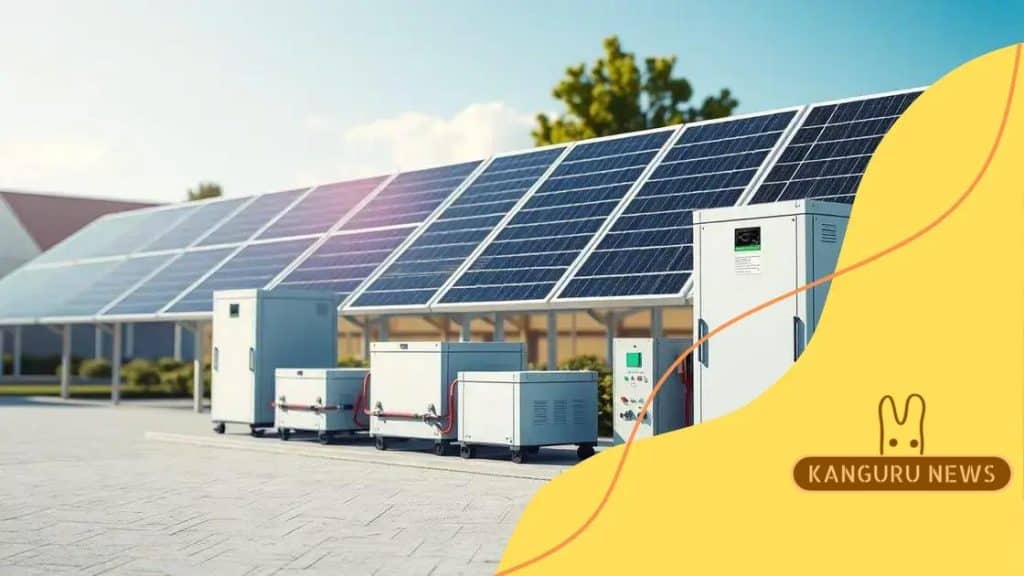Innovations in renewable energy storage systems: what to expect

Anúncios
Innovations in renewable energy storage systems include advanced battery technologies, decentralized energy solutions, and smart grid integration, all aimed at enhancing efficiency and sustainability in energy management.
Innovations in renewable energy storage systems are transforming how we harness and utilize energy. As we seek to combat climate change, these advancements play a vital role in creating a sustainable future. Have you ever wondered how these systems could change your daily life?
Anúncios
Understanding renewable energy storage systems
Understanding renewable energy storage systems is essential for grasping how we can maximize renewable energy use. These systems store energy from renewable sources, allowing us to use it when it’s needed most. They play a crucial role in managing energy supply and demand effectively.
The Basics of Energy Storage
At its core, energy storage involves capturing energy produced at one time for use at a later time. This process is vital for harnessing intermittent energy sources like solar and wind. Here are some key aspects:
- Energy Capture: Energy storage systems can capture electricity generated from solar panels or wind turbines.
- Storage Mechanisms: Common technologies include batteries, pumped hydro storage, and thermal storage.
- Discharge: Energy can be released back into the grid or used on-site when there is high demand.
By understanding these basic functions, we can appreciate how integral renewable energy storage systems are for a sustainable energy future.
Anúncios
Types of Energy Storage Systems
There are several types of energy storage systems, each with its own characteristics and applications. Some of the most common include:
- Lithium-Ion Batteries: Popular for their efficiency and versatility, these batteries are widely used in residential and industrial applications.
- Pumped Hydro Storage: This method uses two water reservoirs at different elevations to generate electricity when water flows downhill.
- Thermal Storage: In this system, heat is stored for later use, typically seen in solar heating applications.
Each type has its benefits, making them suitable for different scenarios. For example, lithium-ion batteries offer quick response times, while pumped hydro storage provides large-scale energy capacity.
The Importance of Energy Storage
As the adoption of renewable energy sources grows, so does the need for advanced storage solutions. Renewable energy storage systems help to balance energy supply and demand, ensuring a reliable power grid. They enable us to maximize the use of environmentally friendly energy sources, reducing our reliance on fossil fuels.
Moreover, these systems contribute to grid stability, allowing for efficient energy management during peak loads. They also facilitate the integration of more renewable energy into the grid, ultimately leading to a more sustainable future.
Recent advancements in solar energy storage
Recent advancements in solar energy storage have significantly enhanced how we harness and use solar power. With technology evolving rapidly, new solutions are making solar energy more accessible and efficient. This is essential for meeting our growing energy needs sustainably.
Innovative Battery Technologies
One of the most exciting developments is in battery technology. Companies are investing in more efficient and longer-lasting batteries for solar energy storage. This allows homeowners and businesses to store surplus energy generated during the day for use at night or on cloudy days.
- Lithium Iron Phosphate Batteries: These batteries are known for their stability and longevity, making them ideal for solar applications.
- Solid-State Batteries: This emerging technology promises higher energy densities and improved safety compared to traditional lithium-ion batteries.
- Flow Batteries: With their ability to scale easily, flow batteries are gaining popularity for large solar installations.
As these battery technologies improve, we can expect solar energy systems to become even more reliable.
Smart Inverters and Energy Management Systems
Another key advancement is in smart inverters and energy management systems. These devices optimize how energy from solar panels is stored and used. By integrating with home appliances, smart inverters can allocate energy usage based on real-time needs and available solar power.
This means that homes equipped with these systems can maximize their use of solar energy, reducing reliance on the grid during peak hours. As smart technologies progress, we can anticipate even more intuitive and efficient energy solutions.
Integration with Smart Grids
Recent improvements also focus on how solar energy storage systems integrate into smart grids. This integration allows for better energy distribution and enhances grid reliability. Smart grids can manage energy loads more effectively, ensuring that stored solar energy is utilized optimally.
Moreover, they help balance supply and demand, particularly during periods of high consumption. As a result, we move closer to a more sustainable and resilient energy future.
Innovative battery technologies and their benefits

Innovative battery technologies are transforming the field of energy storage, especially in renewable energy systems. With advancements in materials and design, these batteries are more efficient and sustainable than ever before. As we explore these technologies, we can see how they contribute to a cleaner energy future.
Types of Innovative Battery Technologies
There are several exciting types of batteries making waves in the energy storage sector. Each type brings unique benefits and applications:
- Lithium-Ion Batteries: These are the most common type found in everyday electronics and electric vehicles. They offer high energy density and long cycle life, making them ideal for solar energy storage.
- Solid-State Batteries: These batteries use solid electrolytes instead of liquid ones, improving safety and energy density. They are seen as the future of energy storage.
- Flow Batteries: These operate by storing energy in liquid electrolyte solutions. They can be scaled easily for large energy needs and are excellent for renewable applications.
- Sodium-Ion Batteries: A promising alternative to lithium-ion technology, sodium-ion batteries offer lower costs and use abundant materials, reducing environmental impact.
These battery technologies are pushing the boundaries of what we can achieve with renewable energy.
Benefits of Innovative Battery Technologies
The benefits of these advanced battery systems extend beyond just energy storage. Here are some key advantages:
- Improved Efficiency: New technologies enhance energy conversion rates, ensuring more energy is stored and used effectively.
- Longer Lifespan: Many modern batteries come with longer lifespans, reducing the need for frequent replacements and lowering overall costs.
- Environmental Benefits: Innovations often focus on using sustainable materials, reducing the carbon footprint associated with battery production and disposal.
- Versatility: Different battery types can be tailored for various needs, from residential solar systems to large-scale grid applications.
As these technologies continue to evolve, we can expect them to play a crucial role in enhancing our energy infrastructure. By embracing innovative battery technologies, we pave the way towards a more sustainable energy future. The advancements not only address current energy storage challenges but also open up new possibilities for energy use and management.
Role of smart grids in energy storage
The role of smart grids in energy storage is becoming increasingly important as we shift towards more sustainable energy solutions. Smart grids use digital technology to monitor and manage the transport of electricity from all generation sources. They enhance the efficiency and reliability of energy delivery.
How Smart Grids Work
Smart grids incorporate various technologies to optimize how energy is generated, stored, and consumed. One key feature is the use of sensors and smart meters that provide real-time data on energy usage and grid conditions. This information allows utilities to respond quickly to changes in demand and supply.
- Real-Time Monitoring: Smart grids continuously monitor energy flow, helping to balance supply and demand.
- Integration with Renewable Sources: They allow for seamless integration of renewable energy sources, making it easier to incorporate solar and wind power.
- Automated Control Systems: These systems can automatically redirect energy flows to prevent outages and minimize waste.
This intelligent management is crucial for maximizing the efficiency of renewable energy storage systems.
Benefits of Smart Grids for Energy Storage
Smart grids provide several benefits when it comes to managing energy storage. They enable better planning and forecasting, helping utilities predict periods of high demand. This allows for effective management of energy storage resources, ensuring that energy is available when needed most.
Additionally, smart grids help optimize energy storage systems by enabling energy to be stored during low demand and released during peak times. This capability reduces stress on the grid and enhances overall reliability. With smart grids, users can also take advantage of lower electricity rates by using stored energy during off-peak hours, resulting in cost savings.
Future Perspectives
The future of energy storage is closely tied to the evolution of smart grids. As technology advances, we can expect even more integration and efficiency. Innovations like vehicle-to-grid systems, where electric cars act as storage units, are just starting to be explored. The combination of smart grids and energy storage technology promises a more responsive and resilient energy system.
Future trends in renewable energy storage solutions
Future trends in renewable energy storage solutions promise exciting advancements that will shape how we use and manage energy. As technology progresses, new solutions are emerging to enhance efficiency and sustainability.
Enhanced Battery Technologies
One significant trend is the development of advanced battery technologies that offer greater energy density, faster charging times, and longer lifespans. Researchers are exploring choices like lithium-sulfur and solid-state batteries. These innovations are set to outperform traditional lithium-ion batteries in many aspects.
- Lithium-Sulfur Batteries: These are lighter and cheaper, with the potential for higher energy storage capacity.
- Solid-State Batteries: With solid electrolytes, they promise better safety, efficiency, and durability.
As these technologies evolve, they will play a crucial role in making renewable energy more practical and accessible.
Decentralized Energy Systems
Another emerging trend is the move towards decentralized energy solutions. This approach allows individuals and communities to generate and store their own energy. Technologies like microgrids and home energy storage systems are gaining popularity.
Decentralized systems offer benefits such as increased energy independence and resilience against grid failures. Homeowners can utilize solar panels with storage solutions to rely less on traditional energy, promoting sustainability.
Integration with Smart Technologies
The integration of smart technologies is also a critical trend. Devices that communicate with each other can optimize energy use. Smart meters and energy management systems allow users to track their consumption and adjust accordingly.
This optimization leads to better utilization of stored energy and helps manage peak demand more effectively. As more systems become interconnected, we will see improvements in the reliability and stability of energy grids.
Policy and Market Developments
Lastly, supportive policies and market developments are essential for promoting renewable energy storage solutions. Governments are implementing incentives for renewable energy adoption, driving more investments into innovative storage options. These efforts encourage research and development, ultimately leading to more efficient and effective energy solutions.
FAQ – Frequently Asked Questions about Renewable Energy Storage Solutions
What are renewable energy storage solutions?
Renewable energy storage solutions are systems that capture and store energy from renewable sources like solar and wind, allowing for energy use when demand exceeds production.
How do smart grids enhance energy storage?
Smart grids use technology to optimize energy distribution and management, allowing for better balance between supply and demand and improved integration of renewable energy.
What are the benefits of advanced battery technologies?
Advanced battery technologies offer higher energy density, longer lifespans, and improved safety, making them essential for effective energy storage.
Why is decentralization in energy systems important?
Decentralization enables individuals and communities to generate and store their own energy, increasing independence and resilience against grid failures.





